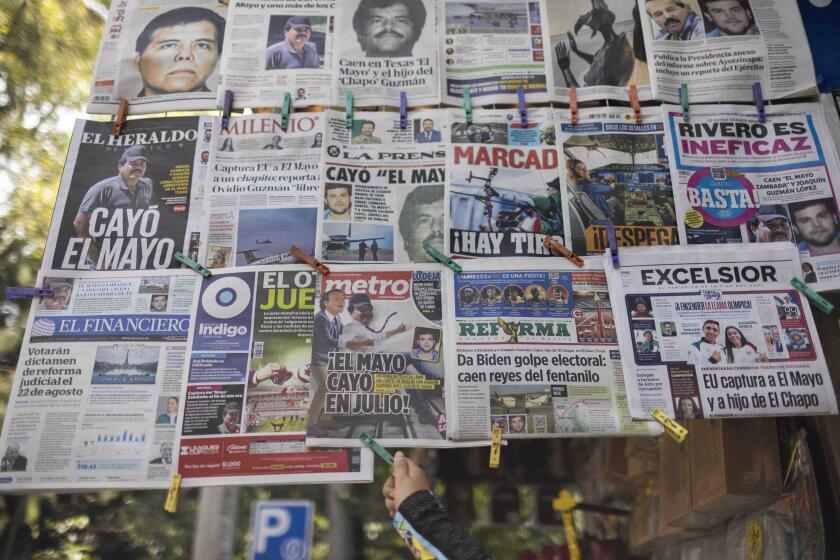China’s premier begins 3-day visit to North Korea
Chinese Premier Wen Jiabao met with North Korean leader Kim Jong Il in Pyongyang on Sunday, kicking off a three-day visit that could indicate whether reclusive North Korea will return to the negotiating table over its nuclear weapons program.
Chinese state media released photographs of Wen being greeted at Sunan International Airport by Kim, who was wearing his signature sunglasses and khaki suit. Kim’s presence challenged speculation that he was losing his grip on the regime after reports that he was battling pancreatic cancer.
The high-level talks were described as a way to strengthen bilateral ties by signing agreements on trade, education and tourism as well as to mark the 60th anniversary of the establishment of diplomatic relations between the two countries, the official New China News Agency said.
State media reported that Wen paid tribute to Kim’s late father, Kim Il Sung, by visiting his mausoleum and viewed an opera of a classic Chinese Qing Dynasty novel performed especially for his visit.
It was unclear what issues Wen and Kim discussed Sunday, but Chinese pressure is considered one of the keys to persuading the Pyongyang government to resume the six-nation nuclear disarmament talks that it abandoned in April. The talks involve the United States, China, Russia, Japan, North Korea and South Korea.
China is North Korea’s chief link to the outside world both diplomatically and economically, with about $2.8 billion in two-way trade last year. However, Beijing has favored a nonnuclear neighbor and supported United Nations sanctions against North Korea after it conducted a nuclear test this year.
The sanctions target the sales and financing of arms to Pyongyang and largely do not interfere with the two countries’ commercial ties.
At a news conference last week to discuss Wen’s visit, Chinese Foreign Ministry spokeswoman Jiang Yu said it was in the interest of all regional partners to establish a denuclearized Korean peninsula, the New China News Agency reported.
“The six-party talks are an effective and practical way to realize the denuclearization of the peninsula,” Jiang said.
North Korea’s international standing seemed to be reaching new lows when it quit the talks, announced it had restarted a nuclear reactor and carried out bomb and missile tests.
But in July, Pyongyang signaled that it was open to restarting dialogue over its weapons program. The following month, North Korean officials opened talks with South Korea for the first time in two years. The North then invited Stephen Bosworth, special envoy to North Korea, to visit. The U.S. is said to be mulling the invitation but has traditionally favored resuming the six-nation talks.
According to news reports, senior State Department official Philip Goldberg is in the Middle East this week trying to establish strict enforcement of U.N. sanctions against North Korea out of concern that Pyongyang could funnel arms to terrorists.
The Associated Press reported Friday that the Obama administration was using a tactic employed by President George W. Bush: targeting private banks in Asia suspected of having North Korean ties, in an attempt to stop money that could pay for arms proliferation.
Curtailing North Korea’s nuclear ambitions is expected to be one of the leading issues discussed between Beijing and Washington officials when President Obama makes his first official visit to China in November.
--
More to Read
Sign up for Essential California
The most important California stories and recommendations in your inbox every morning.
You may occasionally receive promotional content from the Los Angeles Times.











